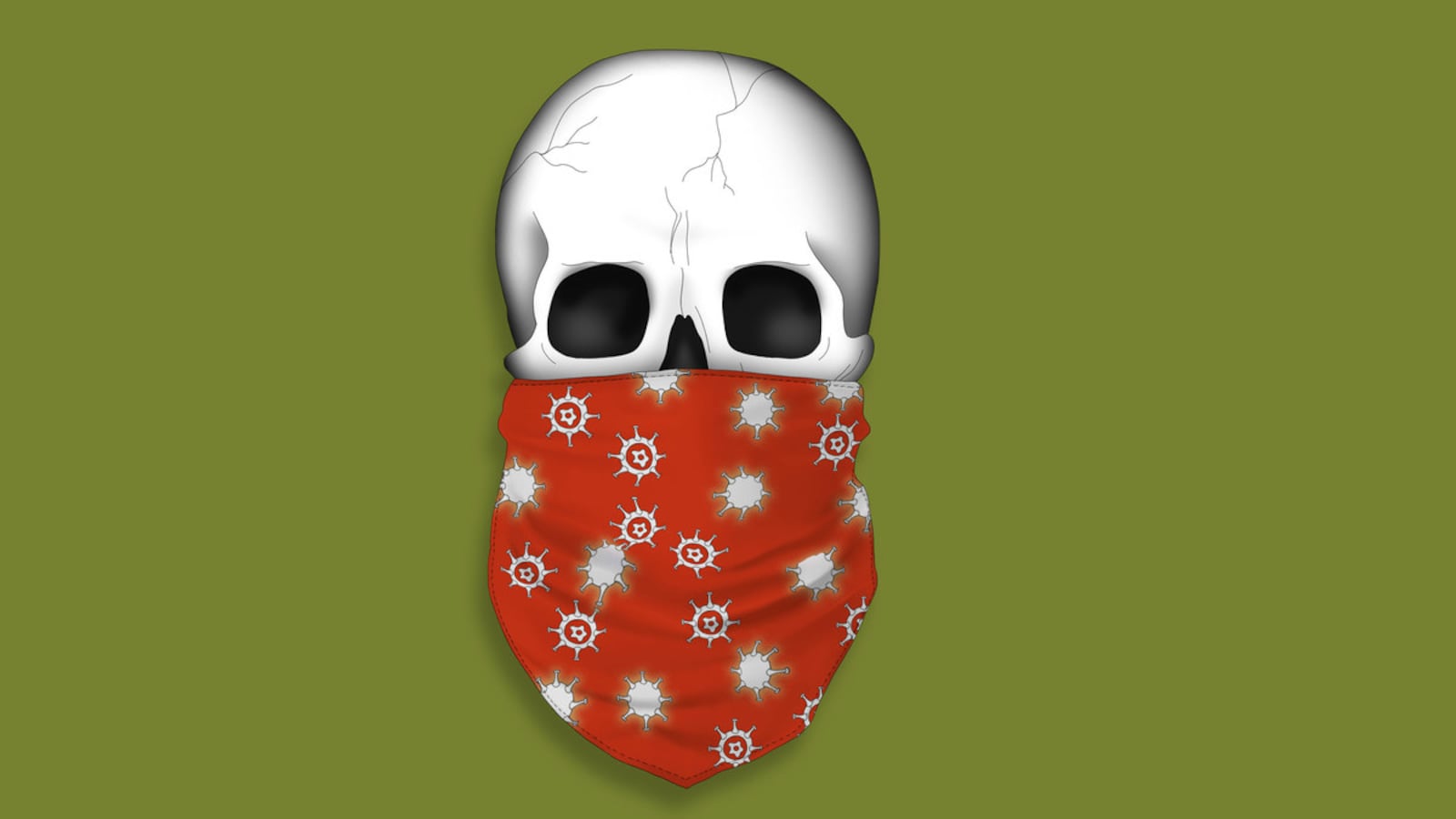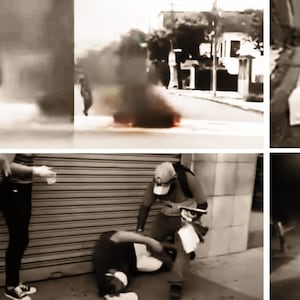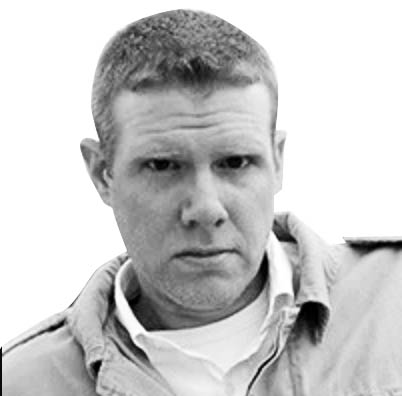CALI, Colombia—As the outbreak spreads, hospitals across Mexico are falling short of vital medical supplies. And with state and federal authorities unable to meet their demands, some health centers have turned to an unlikely savior: El Chapo.
El Chapo 701 is a private company named after infamous drug lord Joaquín “El Chapo” Guzmán and owned by his daughter Alejandrina Guzmán. (The 701 refers to Guzmán’s one-time ranking on Forbes list of the world’s wealthiest people.) In the wake of the coronavirus crisis, Chapo’s namesake enterprise has seized international headlines by doing things the government can’t or won’t do.
The Guzmán family’s outfit has already set up an aid hotline for senior citizens on social media. Masked workers take to the streets to hand out care packages emblazoned with the company’s website logo—a stylized El Chapo himself. He may be serving life without parole in the United States, but among the needy in Guadalajara his face is everywhere. And now, as requests flow in, the company has vowed to help supply hospitals in four major Mexican cities, including the nation’s capital.
The El Chapo franchise is not alone. Cartels and crime groups in many parts of Mexico—indeed, in many parts of Latin America—are taking it on themselves to answer the coronavirus call.
In Mexico that assistance always aims for maximum visibility: aid packages with unique and distinctive labels that identify the cartel or a specific capo, given out by sicarios (hitmen) who are being filmed for viral uploads to Facebook—which in turn garner additional attention from major press outlets.
March of 2020 was the most violent month on record for Mexico's Drug War, with 2,585 homicides. Mexican President Andrés Manuel López Obrador has urged the cartels to "lay off" their turf wars instead of handing out aid packages, but such a response seems unlikely.
“They’re taking advantage of the situation to build their brand,” says Emanuel Gallardo, a Mexican journalist who specializes in covering the cartels. “The government should occupy that role but they're not doing shit. So organized crime moves in and takes up the slack.”
‘KILLERS ALWAYS GIVE AWAY GOODIES’
Drug lords handing out gifts in their communities is nothing new. Pablo Escobar famously built churches, soccer fields, and paved roads in Colombia. The Guzmán family is even planning to found a university in their home state of Sinaloa. But the current pandemic provides a unique window of opportunity for such groups to increase their power and achieve legitimacy.
The author of a new paper on “criminal insurgency” behavior during the COVID crisis, Robert Bunker of the U.S. Army War College, says the cartels are creating parallel institutions that rival traditional authorities’ monopoly on power.
“The cartels in Mexico have been gradually eroding state solvency for some decades now,” he says. “They do this to further their illicit economic activities [and] achieve de facto political control. The gains being made by the cartels during the COVID-19 crisis [are] accelerating this process.”
Journalist Gallardo agrees that the proliferating images of “killers giving away goodies” hide an ulterior motive.
“The narcos are not taking any kind of large-scale social responsibility. They're just using this to show the people who's ruling them,” Gallardo told The Daily Beast. “It’s the narco way to show power in Mexico. They control people in that way.”
LOCKED DOWN OR SHOT DOWN
Criminal gangs elsewhere in Latin America have adopted a more violent, intimidation-based approach to deal with the pandemic.
In Colombia, for example, guerrilla groups that traffic in cocaine and other narcotics have blanketed rural communities in much of the country with pamphlets threatening deadly consequences for residents who violate self-isolation rules.
One such edict put out by the National Liberation Army (ELN) in the northern Bolívar region states, “We are forced to kill people in order to preserve lives,” and accuses locals of not having “respected the orders to prevent COVID-19.”
The ELN agreed to a temporary ceasefire with the government at the beginning of the outbreak, but continues to prey on civilian populations. Part of what makes these lockdown-or-else threats so sinister is that guerrilla death squads are already taking advantage of the crisis to track down and kill quarantine-immobilized social leaders who oppose them.
In the port town of Tumaco, on the Pacific Coast, the Oliver Sinisterra Front—a renegade offshoot from the now-demobilized Revolutionary Armed Forces of Colombia (FARC)—threatens to make “military targets” of anyone who fails to comply with the group’s draconian isolation measures.
“We’re like prisoners in our own homes because of these bandits,” says Julia Díaz, 55, who owns a hotel in the town of Toribio, another rogue-FARC stronghold in the southern Cauca region. “Everyone is afraid, everyone feels helpless. We can’t even go out to visit the doctor without worrying they’ll kill us.”
José Miguel Vivanco, the executive director for the Human Rights Watch (HRW) Americas Division, and the author of a recent report on COVID-related violence in Colombia, describes the country’s official response to the outbreak as “generally strong” in large cities.
In more rural districts, however the response has been marred by “structural failures” because “government presence is weak and dysfunctional, allowing armed groups to thrive and exercise control over the population,” he says. “In these areas, access to justice, security, and basic public services is often extremely limited, if not null.”
Part of what makes total quarantine so challenging for many low-income earners in Colombia is that they have no resources to fall back and must work for daily wages to survive, even under threat of death from drug-running guerrillas.
“The full lockdown may be hard to implement in areas with pervasive poverty where people need to leave their houses every day if they want to have any food on their plates,” Vivanco says.
‘IT’S NOT GOING TO TURN OUT WELL’
Elsewhere in Latin America some criminal organizations have responded to the pandemic with a carrot, others with a stick. In Guatemala, for instance, Barrio 18 gang members are suspending their extortion rackets while the crisis lasts. Whereas MS13 in El Salvador is, like ELN and ex-FARC, issuing death threats to those who refuse to stay at home.
The most comprehensive response by any crime group in the hemisphere appears to be in the favelas of Brazil. There powerful drug traffickers like the Comando Vermelho (Red Command) impose strict social distancing backed by threats, while also distributing much-needed supplies.
In the poor neighborhoods around Rio de Janeiro, loudspeakers blare messages such as “Anyone found messing [around] or walking around outside will be punished,” even as other gang members go door-to door to pass out soap and encourage people to wash their hands.
In reacting to the virus, different crime groups tend to play to their strengths, says security analyst Bunker.
“A cartel in Mexico has far more wealth than a gang [in Brazil] but not the manpower to so tightly control its neighborhoods. In Colombia the ELN or ex-FARC groups might not have the manpower or wealth but they can utilize a terror-based approach.”
Some observers have speculated that the fallout from coronavirus could weaken the cartels. Proponents of this theory say that a lack of precursor chemicals and drugs from China, including fentanyl, combined with closed borders and less disposable income for users in the U.S., will drain the narcos' coffers. But others point to the flexibility exhibited by other crime groups, including the Italian mafia, which appears to be thriving during the pandemic.
"The gangs and cartels throughout the Americas are not going to idly sit on the sidelines and watch their incomes go into free fall," Bunker says. Instead, he suggests these groups will use their existing networks to seek out other revenue streams such as "kidnapping and extortion, forced sexual slavery, or potentially even organ harvesting in order to provide new cash flow avenues."
HRW director Vivanco also says it's unclear how Colombian and Venezuelan guerrillas—who remain the world's leading cocaine suppliers—will be impacted. "Higher levels of poverty may make it easier for them to recruit, while variations in international prices of cocaine and gold will impact their economies. Similarly, the lockdown will make it harder for authorities to control deforestation, making it easier for armed groups [engaged in illegal logging and mining] to gain profit."
In any case, Bunker says, the show of strength by various crime groups during the outbreak has exposed the weakness of national governments in many Latin American countries.
“What the pandemic does to the power dynamic between the state and organized crime—in both the short and long term—is not going to turn out well,” he says.






